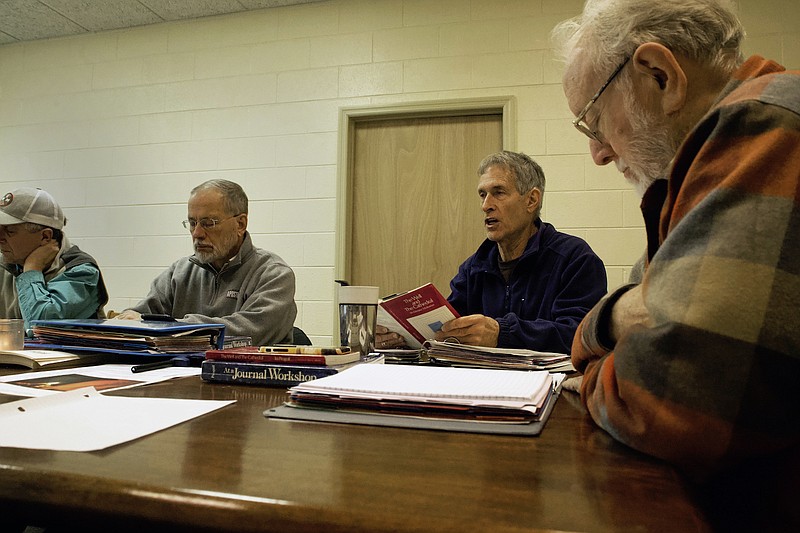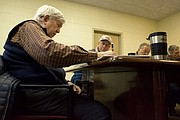A solitary practice best done in a group.
The six men gathered at First Christian Church on McCallie Avenue lean over their binders, just like they have every week for years. Their pens move across the loose-leaf pages as they sit in silence.
While the room is quiet, the dialogues happening on the page are anything but.
Intensive, spiritual journaling is a practice created by the psychologist Ian Progoff. Through writing exercises and meditations, participants gain awareness in their lives by reflecting on experiences, people and imagery, for example. The retired or semi-retired men at First Christian said the practice allows them to plumb the depths of themselves, understanding why they act the way they do or what is holding them back from better relationships.
"You can allow yourself to be honest in your journal in ways that you're lying publicly," Robert Smith said. "And you're better able to realize it."
Several members of the group took a two-day workshop on the journaling process in 2006. The group started formally meeting for several hours a week in 2015. They worked through the prompts of a Progoff workbook. Now, each week, they read an introductory meditation to jump-start their writing. They journal about their relationships with people or work, symbols such as art that speaks to them and about their connection to things bigger than themselves, such as faith.
The approach to the journaling process is very structured but it allows someone to investigate the parts of life that are less structured, Bruce Blohm said.
Some of the participants write dialogues like a movie script with people in their lives who have died and people they may have issues with. Other times, after they have written, the men re-read the passage and write about their reactions.
Mel Cooper said the practice is a regular reminder that life is a constant learning process.
"What always struck me about the journal is that it allows me the space to look at my life and say, 'I know I'm struggling with some things, there are some things I need to change, but I can do this,'" he said. "'I've done this before.'"
The group setting holds the participants accountable in maintaining the practice, they said. Some weeks, they share what stood out to them while writing, though they rarely if ever read their journals out loud. Those insights are personal. Several of the men joked they instructed their families to burn the journals when they die. Privacy allows for greater insight, said B.W. Ruffner.
"You don't want to be posturing in here," he said. "You want to be perfectly honest."
While the method is not overtly religious, several of the men said they use it to deepen their faith and better understand God's will in their lives.
Jim Henry, a retired engineering professor, said the journaling allowed him to better understand his tendency to judge quickly.
"All these writings, digging down deep in myself recently, I dug down deep in my judgmentalness and realized being judgmental about people or countries or anything isn't helping me, so just let it go," he said.
The DuBose Conference Center in Monteagle, Tennessee, is hosting a series of workshops on the intensive journaling process on March 20-25.
Contact Wyatt Massey at wmassey@timesfreepress.com or 423-757-6249. Follow him on Twitter @news4mass.

